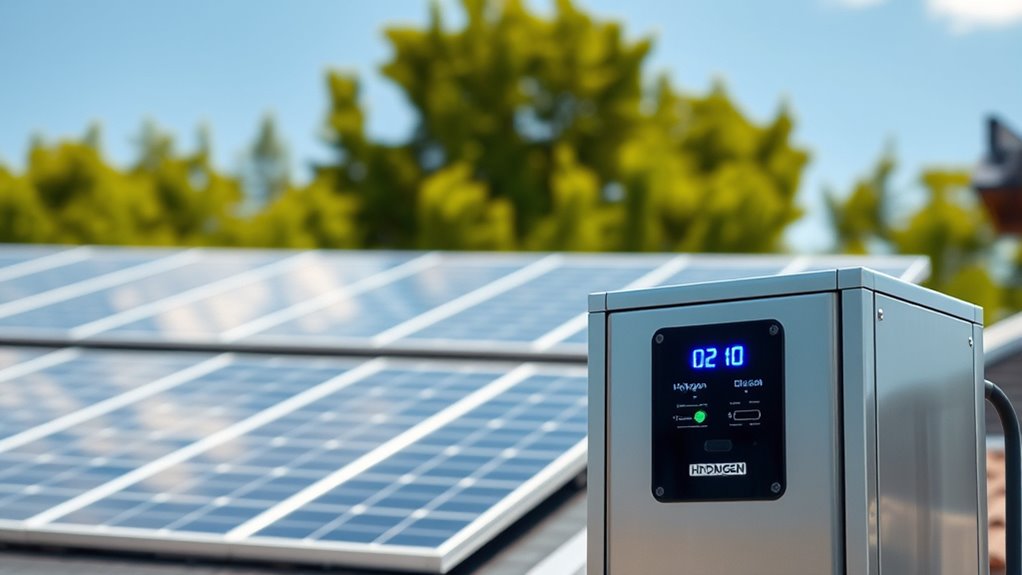Hydrogen energy offers a safe, efficient, and clean way to power your home, with storage options like compressed gas in high-pressure tanks or liquid hydrogen at very low temperatures. Both methods have safety features and are designed to prevent leaks or accidents when properly managed. Advances in storage technology are making residential fuel cells more practical and cost-effective. To learn more about how hydrogen could fit into your home energy system, keep exploring these innovative solutions.
Key Takeaways
- Hydrogen can be stored safely as compressed gas or liquid, with ongoing innovations improving safety and space efficiency for residential use.
- Proper storage systems prevent leaks and accidents, making hydrogen a viable and safe energy option for homes.
- Advances in storage technology are making hydrogen more affordable and practical for household energy systems.
- Safety considerations include robust high-pressure tanks for gas and specialized insulation for liquid storage.
- Future developments aim to develop safer, more compact, and cost-effective hydrogen storage solutions for homeowners.

Hydrogen storage is a critical part of integrating hydrogen energy into your household. Since hydrogen is the lightest element, storing it safely and efficiently can be challenging. Typically, it’s stored either as compressed gas in high-pressure tanks or as a liquid at very low temperatures. Each method has its pros and cons. Compressed hydrogen tanks are more straightforward but require robust, high-pressure containers to prevent leaks or accidents. On the other hand, liquid hydrogen storage is more space-efficient but demands specialized insulation to maintain the low temperatures, which can be costly. As a homeowner, understanding these options helps you evaluate what’s feasible for your property and safety requirements. Advances in storage technology are making it easier to adopt hydrogen, with newer systems focusing on safer, more compact solutions that could fit into residential settings in the future. Additionally, innovations in storage technology are continually enhancing safety and efficiency, making residential hydrogen systems increasingly viable.
Frequently Asked Questions
Can Hydrogen Energy Be Used for Residential Heating Systems?
Yes, hydrogen energy can be used for residential heating systems, but you should consider hydrogen safety and residential integration. Modern systems are designed with safety in mind, minimizing risks associated with hydrogen. If you choose to adopt hydrogen for heating, guarantee your home’s infrastructure is compatible and properly installed by professionals. This way, you can enjoy cleaner energy while maintaining safety standards, making hydrogen a viable option for your home heating needs.
What Safety Measures Are Necessary for Home Hydrogen Storage?
A wise man once said, “Better safe than sorry.” When storing hydrogen at home, you need to prioritize storage safety and leak prevention. Use reinforced, ventilated containers specifically designed for hydrogen, and regularly check for leaks with appropriate detection equipment. Keep storage areas cool, dry, and away from ignition sources. Proper safety measures make certain your hydrogen system remains secure, reducing risks and keeping your home safe.
How Does Hydrogen Energy Impact Home Insurance Policies?
Hydrogen energy can affect your home insurance policies by introducing new insurance implications and potential policy adjustments. You might face higher premiums or specific coverage requirements due to the associated risks. It is crucial to discuss these changes with your insurer beforehand, ensuring your policy adequately covers hydrogen storage and usage. Being proactive helps you avoid surprises and secures your home’s safety and financial protection as you adopt this clean energy source.
Are Government Incentives Available for Installing Hydrogen Energy Systems?
Yes, government incentives are available for installing hydrogen energy systems. You can take advantage of policy grants and tax credits that help offset installation costs. These incentives aim to promote clean energy adoption and reduce your overall energy expenses. Be sure to check with local and federal agencies to find out about current programs and eligibility requirements, so you can maximize your savings and support sustainable energy efforts.
What Is the Lifespan of Home Hydrogen Fuel Cells?
Your home hydrogen fuel cell typically offers a lifespan of around 8 to 15 years, depending on hydrogen durability and maintenance. Proper care can extend fuel cell longevity, ensuring reliable energy production. Regular inspections and timely servicing help prevent wear and tear, maximizing your investment. Keep in mind that advancements in technology may improve hydrogen durability and fuel cell longevity over time, offering even longer-lasting options for your home energy needs.
Conclusion
While hydrogen energy holds exciting possibilities, it’s worth keeping an eye on how things develop. As the technology matures, you might find it becoming a more seamless part of your home’s energy future. Staying informed now guarantees you’re prepared for the subtle shifts ahead. Embracing this quiet revolution could gently transform your everyday life, offering a cleaner, more sustainable way to power your home without the noise of big changes. Keep watching—your energy future might just surprise you.









